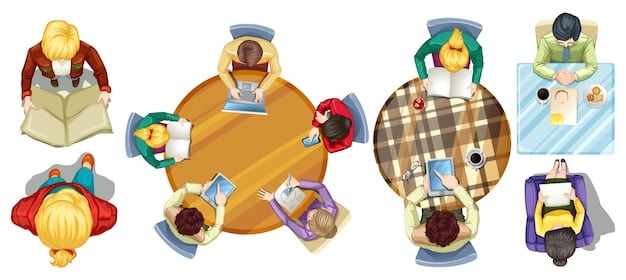The Ultimate Guide to Tabletop Gaming for Geeky Lifestyles

Tabletop gaming, a cornerstone of geek culture, transcends mere entertainment, offering strategic depth, social interaction, and immersive storytelling experiences that cater to diverse geeky interests and fostering communities worldwide.
Are you a geek looking for your next obsession? Look no further than the world of tabletop gaming. It’s more than just a hobby; it’s a lifestyle, a community, and a way to express your strategic genius. Get ready to roll the dice and dive in!
Why Tabletop Gaming Resonates with Geek Culture
Tabletop gaming isn’t just about rolling dice and moving pieces; it’s a deep dive into worlds of imagination, strategy, and community. For geeks, it’s a perfect fit, offering a unique blend of intellectual stimulation and social connection.
The Appeal of Strategic Depth
Many tabletop games demand a high degree of strategic thinking. From resource management to tactical maneuvering, these games challenge players to think critically and creatively.
The Social Element
Unlike solitary video games, tabletop gaming is inherently social. It’s a chance to gather with friends, make new ones, and bond over shared challenges and triumphs. This social interaction is a key part of what makes tabletop gaming so appealing.
- Community Building: Gaming groups create tight-knit communities where players can share their passion and support each other.
- Face-to-Face Interaction: In an increasingly digital world, tabletop gaming provides valuable face-to-face interaction.
- Shared Experiences: The thrill of victory, the agony of defeat—these shared experiences forge lasting bonds among players.
Tabletop gaming provides a refreshing escape from the digital world, offering real-world interaction and strategic challenges that resonate deeply with geek sensibilities.
Exploring Different Genres of Tabletop Games
The world of tabletop gaming is incredibly diverse, with genres to suit every taste and interest. From fantasy adventures to historical simulations, here’s a glimpse into some popular categories.

Fantasy and Adventure Games
These games transport players to fantastical realms filled with magic, monsters, and epic quests. Games like Dungeons & Dragons and Pathfinder allow players to create their own characters and embark on thrilling adventures.
Strategy and War Games
For those who enjoy strategic thinking and tactical maneuvering, strategy and war games are a perfect fit. Games like Risk and Settlers of Catan challenge players to outwit their opponents and build empires.
- Historical Simulations: Games that recreate historical battles and events, requiring players to understand and apply historical strategies.
- Abstract Strategy: Games that focus on pure strategy, with no luck or chance involved, such as chess and Go.
- Area Control: Games where players compete to control territory and resources.
Exploring the diverse genres of tabletop gaming allows geeks to find games that align with their interests, whether it’s the immersive storytelling of fantasy games or the strategic depth of war games.
Essential Tabletop Games for Beginners
Starting your tabletop gaming journey can be daunting with so many options available. Here are a few essential games that are perfect for beginners, offering easy-to-learn rules and engaging gameplay.
Codenames
Codenames is a word association game where two teams compete to identify their secret agents based on one-word clues given by their spymasters. It’s a fun and accessible game that’s perfect for parties and family gatherings.
Ticket to Ride
Ticket to Ride is a railway-themed board game where players collect train cards and claim railway routes connecting cities across a map. The game is simple to learn but offers plenty of strategic depth.
For beginners eager to explore tabletop gaming, Codenames and Ticket to Ride offer easy-to-learn rules and plenty of replayability. These games provide a gateway to the broader world of tabletop gaming.

The Role of Tabletop Gaming in Geek Social Life
Tabletop gaming plays a significant role in geek social life, providing opportunities for connection, collaboration, and community building. It’s more than just a hobby; it’s a social outlet.
Building Friendships
Tabletop gaming provides a structured environment for building friendships. Regular gaming sessions create opportunities for players to interact, share experiences, and form lasting bonds.
Collaborative Storytelling
Many tabletop games, especially role-playing games like Dungeons & Dragons, involve collaborative storytelling. Players work together to create narratives, solve problems, and overcome challenges, fostering teamwork and creativity.
- Shared Narrative Creation: Engaging in collaborative storytelling builds teamwork and creative problem-solving skills.
- Regular Meetups: Regular gaming sessions provide consistent social interaction and a sense of community.
- Support Networks: Gaming groups often become support networks where players can share their passions and support each other.
Tabletop gaming creates a supportive and engaging social environment, fostering friendships and collaborative storytelling that enrich geek social life.
The Evolution of Tabletop Gaming: From Board Games to RPGs
Tabletop gaming has evolved significantly over the years, from traditional board games to complex role-playing games. This evolution reflects changing tastes and technological advancements.
The Rise of Role-Playing Games
Role-playing games (RPGs) like Dungeons & Dragons revolutionized tabletop gaming by introducing character development, storytelling, and improvisation. RPGs allowed players to immerse themselves in fantastical worlds and create their own narratives.
The Influence of Technology
Technology has also played a role in the evolution of tabletop gaming. Online platforms and virtual tabletops allow players to connect and play games remotely, expanding the reach of the hobby.
From traditional board games to innovative RPGs and the influence of technology, tabletop gaming has continuously evolved, adapting to changing tastes and expanding its appeal to geeks worldwide.
Tips for Hosting a Tabletop Gaming Night
Hosting a tabletop gaming night can be a rewarding experience, bringing friends together for an evening of fun and camaraderie. Here are some tips for creating a memorable gaming night.
Creating a Welcoming Atmosphere
Set the stage for a fun and relaxing evening by creating a welcoming atmosphere. Provide comfortable seating, good lighting, and plenty of snacks and drinks.
Choosing Games Wisely
Select games that are appropriate for your group’s skill level and interests. Consider the number of players, the playing time, and the complexity of the rules.
- Snacks and Drinks: Provide a variety of snacks and drinks to keep your guests energized and hydrated.
- Comfortable Seating: Ensure that everyone has a comfortable place to sit, especially for longer gaming sessions.
- Clear Rules Explanations: Be prepared to explain the rules clearly and concisely.
By creating a welcoming atmosphere, choosing the right games, and encouraging participation, you can ensure that everyone has a fantastic time at your tabletop gaming night.
| Key Aspect | Brief Description |
|---|---|
| 🎲 Strategic Depth | Tabletop games require strategic thinking and problem-solving. |
| 🤝 Social Interaction | Gaming fosters friendships and community. |
| ✨ Diverse Genres | From fantasy to strategy, there’s a game for everyone. |
| 🎉 Hosting Tips | Create a welcoming atmosphere for a great game night. |
What are the best tabletop games for beginners?
▼
Great starter games include Codenames and Ticket to Ride. They are easy to learn and offer a lot of fun. Also consider Carcassonne and Settlers of Catan for more strategic options.
▼
Check local game stores, community centers, and online forums. Websites like Meetup and BoardGameGeek often have listings for local gaming groups and events.
▼
Be respectful of other players, know the rules, and be a good sport, win or lose. Focus on having fun and creating a positive experience for everyone involved.
▼
Consider your group’s interests, skill levels, and the amount of time you have available. Read reviews, watch gameplay videos, and ask for recommendations from other gamers.
▼
Board games typically have fixed rules and objectives, while RPGs allow for more open-ended storytelling and character development. RPGs often involve a Game Master who guides the session.
Conclusion
Tabletop gaming offers a rich and rewarding experience for geeks, providing strategic depth, social interaction, and endless opportunities for imaginative play. Whether you’re a seasoned gamer or a curious beginner, the world of tabletop gaming has something to offer everyone. So gather your friends, roll the dice, and embark on your next great adventure!





